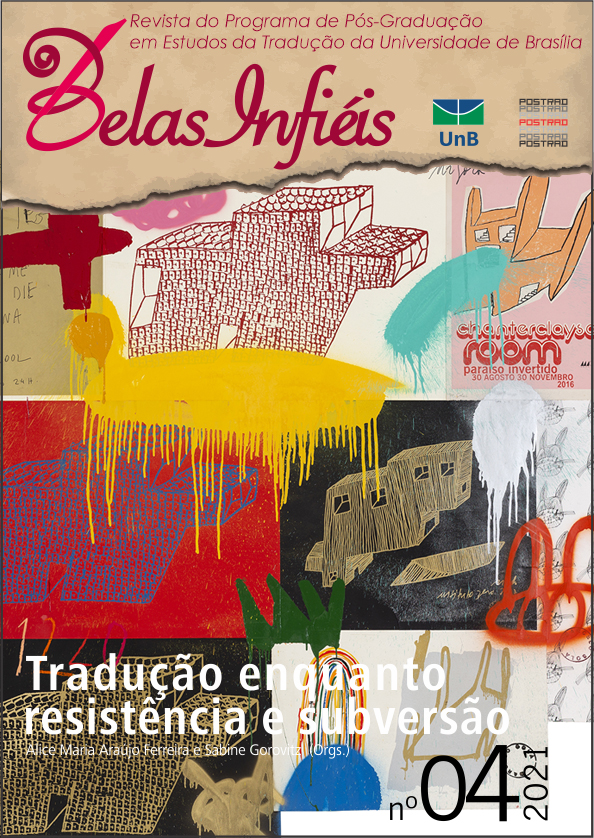Translating at the risk of interpreting: seeking asylum or exile in the language of the other
DOI:
https://doi.org/10.26512/belasinfieis.v10.n4.2021.36301Keywords:
Tradução e subversão; solicitante de refúgio; interpretação comunitária; imigração.Abstract
This is the translation of the text Traduire au risque de l'interprétation : demander asile ou exil dans la langue de l'autre, written by Claire Gillie for the book organised by Arnold CASTELAIN, Traduction et migration: enjeux éthiques et techniques, in 2020. In it, Gillie evokes how it is possible to translate the Other, the one who seeks refuge and asylum, and the helplessness of someone who "has lost everything" - even his port of origin - and who arrives in a land that supposedly "welcomes his helplessness", while the Other, the social bearer of another language.
Downloads
References
GILLIE, Claire. Traduire au risque de l'interprétation : demander asile ou exil dans la langue de l'autre, publicado em CASTELAIN, Arnold. Traduction et migration: enjeux éthiques et techniques. Presses de l’Inalco, 2020.
Assoun, P.-L. (2013). La voix jalouse et le ‘feu dévorant’ ? L’inconscient monothéiste”. In C. Gillie (Org.), La voix sur les Braises, Simpósio Voix/Psychanalyse 2012. Solipsy.
Benjamin, W. (1971). Mythe et violence (v. 1), Denoël.
Benjamin, W. (1971). « La tâche du traducteur ». Mythe et violence, v. 1, p. 261-262, Denoël.
Bonaparte, M. (2004). Topsy, les raisons d’un amour (S. Freud, Trad.). Edition Payot et Rivages. (Obra originalmente publicada em 1937)
Delbe, A. (1995). Le stade vocal. L'Harmattan.
Ferré, L. (1970). Poète, vos papiers [Música]. On Amour Anarchie. Barclay Records.
Freud, S. (1985). L'inquiétante étrangeté et autres essais, Folio essais.
Freud, S. (2010). O futuro de uma ilusão (P. C. Endo, E. L. de Sousa, Ensaio biobibliográfico; R. Zwick, Trad.). L&PM. (Obra originalmente publicada como Das Unheimliche, em 1919)
Freymann, J.-R. (2008). Passe, un père et manque. Eres.
Gillie, C. (2010). Les voix muettes de l’opéra. Colloque de musicothérapie Paris V-2009, Revue française de musicothérapie.
Gillie, C. (2011). Voix flagellées, voix transfigurées ; la condamnation vocale à perpétuité. Simpósio Anthropologie et Psychanalyse/Clinique de La Marge, Grécia.
Gillie, C. (2013). Le sujet de l'inconscient. Un éternel demandeur d'asile. Journée d'étude EPCI Le retour du religieux. Editora EPCI.
Gillie, C. (2014). La traduction à l'épreuve de l'inconscient ; destins de l'allemand freudien. Figures de la psychanalyse, 28, 123-137. https://doi.org/10.3917/fp.028.0123
Gillie, C. (2016, 4 de abril). L’effet Babel dans l’entre-deux langues. Les enjeux actuels de la traduction, Séminaire Traduction et Transdisciplinarité, Paris.
Gillie, C. (2016, outubro). La voix gorge de Pigeon. In C. Klein-Dallant (Org.), De la voix parlée au chant. Editions Klein-Dallant.
Gillie, C. (2017) Retours à la lettre freudienne. Contours et détours d'une langue à l'autre. In E. B. Rossi, P. H. Tavares, W. C. Costa (Org.), Psicanálise entre línguas. 7 Letras.
Gillie, C. (2017, 17 de junho). La traduction ; du contact fugitif entre les langues aux douleurs de l’enfantement. L’opération detraduction et son enjeu. A partir de l’oeuvre de G.A. Goldschmidt, Simpósio Espaço Analítico. Paris.
Green, J. (2004). Le langage et son double. Fayard.
Julien, P. (2008). La psychanalyse et le religieux: Freud, Jung, Lacan. Paris: Cerf.
Lacan, J. (1958). Écrits. Paris: Seuil.
Laplanche, J. (1997). Le primat de l’autre en psychanalyse. Flammarion.
Poizat, M. (1998). Variations sur la voix. Métailié.
Toutin, C. (1984). A travers les langues. Littoral [Traduction de Freud, transcription de Lacan], 13, 43-52.
Downloads
Published
How to Cite
Issue
Section
License
Copyright (c) 2021 CC BY

This work is licensed under a Creative Commons Attribution 4.0 International License.
Given the public access to this journal, the texts are free to use but requires the recognition of the original authorship and initial publication in this journal to be properly stated.
 The journal allows the use of works published for non-commercial purposes, including the right to submit the work to publicly accessible databases. Published contributions are the sole and exclusive responsibility of the author(s).Â



















